Medication Management
VerifiedAdded on 2022/10/12
|8
|2044
|93
AI Summary
This report describes a clinical reasoning cycle for a patient diagnosed with COPD. It includes a proper evaluation of the patient, analysis of the collected information, and identification of the problem. The report also suggests SMART goals for improving self-management and social support to the patient.
Contribute Materials
Your contribution can guide someone’s learning journey. Share your
documents today.

Running head: NURSING
Medication Management
Name of the Student
Name of the University
Author Note
Medication Management
Name of the Student
Name of the University
Author Note
Secure Best Marks with AI Grader
Need help grading? Try our AI Grader for instant feedback on your assignments.
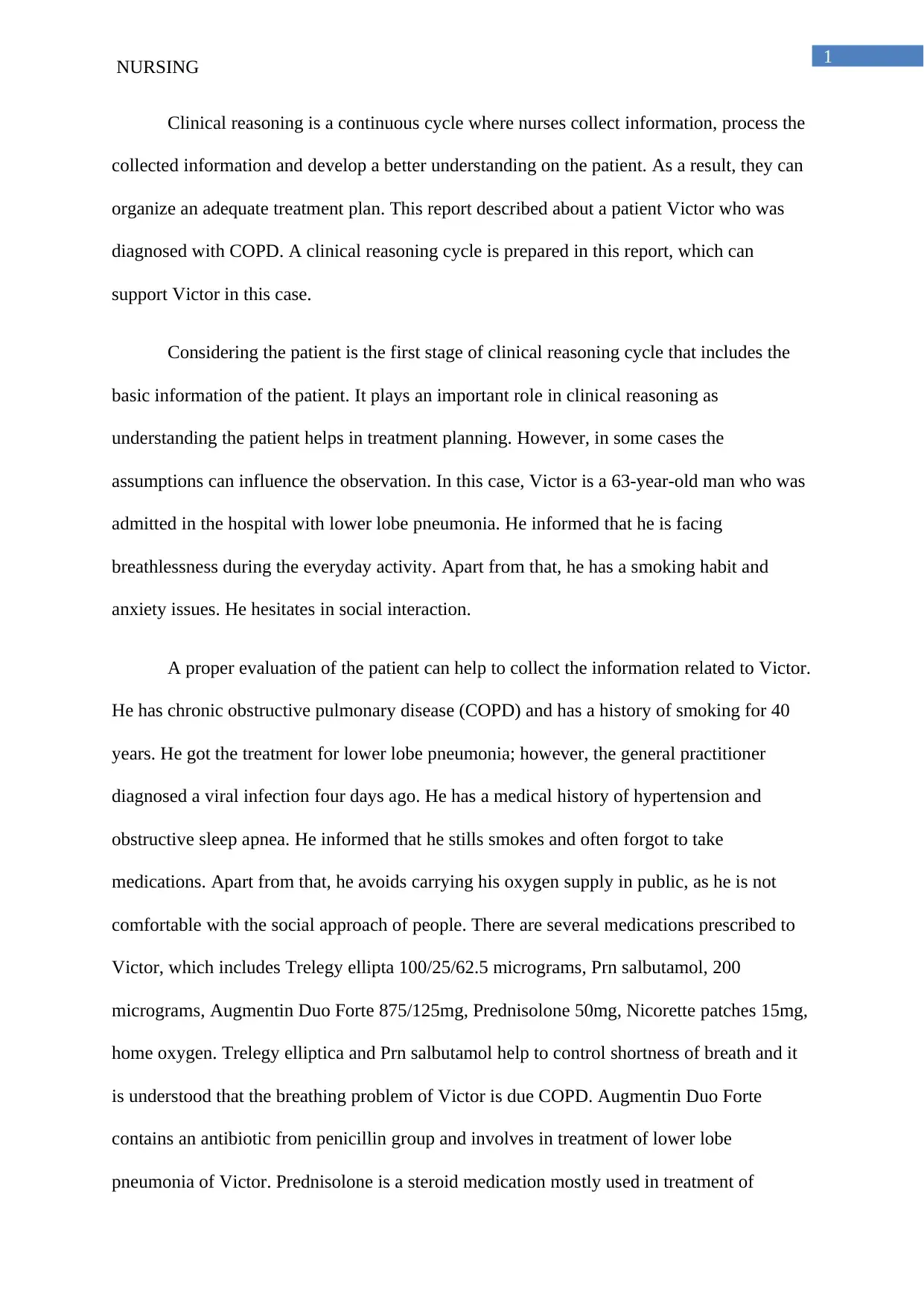
1
NURSING
Clinical reasoning is a continuous cycle where nurses collect information, process the
collected information and develop a better understanding on the patient. As a result, they can
organize an adequate treatment plan. This report described about a patient Victor who was
diagnosed with COPD. A clinical reasoning cycle is prepared in this report, which can
support Victor in this case.
Considering the patient is the first stage of clinical reasoning cycle that includes the
basic information of the patient. It plays an important role in clinical reasoning as
understanding the patient helps in treatment planning. However, in some cases the
assumptions can influence the observation. In this case, Victor is a 63-year-old man who was
admitted in the hospital with lower lobe pneumonia. He informed that he is facing
breathlessness during the everyday activity. Apart from that, he has a smoking habit and
anxiety issues. He hesitates in social interaction.
A proper evaluation of the patient can help to collect the information related to Victor.
He has chronic obstructive pulmonary disease (COPD) and has a history of smoking for 40
years. He got the treatment for lower lobe pneumonia; however, the general practitioner
diagnosed a viral infection four days ago. He has a medical history of hypertension and
obstructive sleep apnea. He informed that he stills smokes and often forgot to take
medications. Apart from that, he avoids carrying his oxygen supply in public, as he is not
comfortable with the social approach of people. There are several medications prescribed to
Victor, which includes Trelegy ellipta 100/25/62.5 micrograms, Prn salbutamol, 200
micrograms, Augmentin Duo Forte 875/125mg, Prednisolone 50mg, Nicorette patches 15mg,
home oxygen. Trelegy elliptica and Prn salbutamol help to control shortness of breath and it
is understood that the breathing problem of Victor is due COPD. Augmentin Duo Forte
contains an antibiotic from penicillin group and involves in treatment of lower lobe
pneumonia of Victor. Prednisolone is a steroid medication mostly used in treatment of
NURSING
Clinical reasoning is a continuous cycle where nurses collect information, process the
collected information and develop a better understanding on the patient. As a result, they can
organize an adequate treatment plan. This report described about a patient Victor who was
diagnosed with COPD. A clinical reasoning cycle is prepared in this report, which can
support Victor in this case.
Considering the patient is the first stage of clinical reasoning cycle that includes the
basic information of the patient. It plays an important role in clinical reasoning as
understanding the patient helps in treatment planning. However, in some cases the
assumptions can influence the observation. In this case, Victor is a 63-year-old man who was
admitted in the hospital with lower lobe pneumonia. He informed that he is facing
breathlessness during the everyday activity. Apart from that, he has a smoking habit and
anxiety issues. He hesitates in social interaction.
A proper evaluation of the patient can help to collect the information related to Victor.
He has chronic obstructive pulmonary disease (COPD) and has a history of smoking for 40
years. He got the treatment for lower lobe pneumonia; however, the general practitioner
diagnosed a viral infection four days ago. He has a medical history of hypertension and
obstructive sleep apnea. He informed that he stills smokes and often forgot to take
medications. Apart from that, he avoids carrying his oxygen supply in public, as he is not
comfortable with the social approach of people. There are several medications prescribed to
Victor, which includes Trelegy ellipta 100/25/62.5 micrograms, Prn salbutamol, 200
micrograms, Augmentin Duo Forte 875/125mg, Prednisolone 50mg, Nicorette patches 15mg,
home oxygen. Trelegy elliptica and Prn salbutamol help to control shortness of breath and it
is understood that the breathing problem of Victor is due COPD. Augmentin Duo Forte
contains an antibiotic from penicillin group and involves in treatment of lower lobe
pneumonia of Victor. Prednisolone is a steroid medication mostly used in treatment of
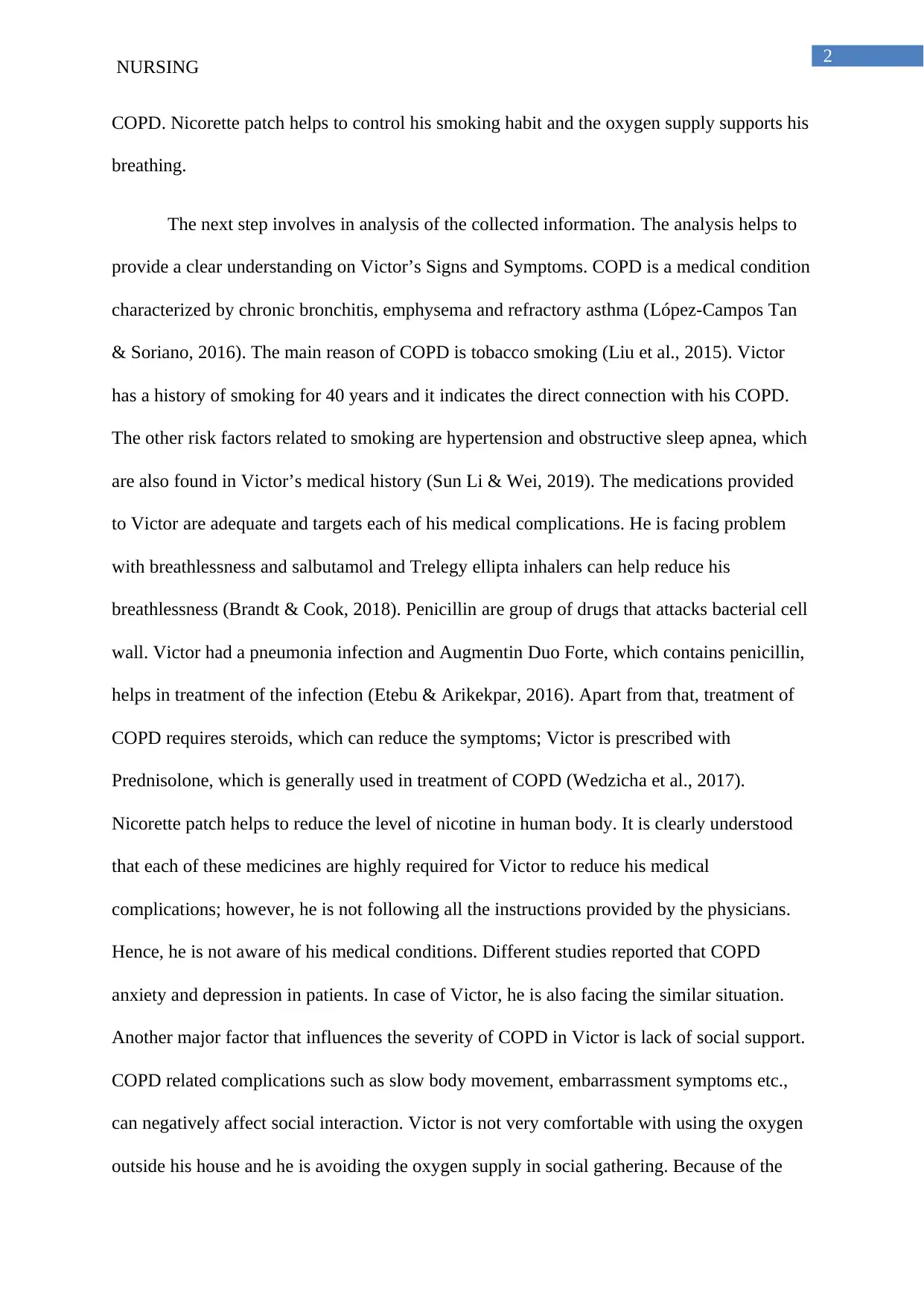
2
NURSING
COPD. Nicorette patch helps to control his smoking habit and the oxygen supply supports his
breathing.
The next step involves in analysis of the collected information. The analysis helps to
provide a clear understanding on Victor’s Signs and Symptoms. COPD is a medical condition
characterized by chronic bronchitis, emphysema and refractory asthma (López‐Campos Tan
& Soriano, 2016). The main reason of COPD is tobacco smoking (Liu et al., 2015). Victor
has a history of smoking for 40 years and it indicates the direct connection with his COPD.
The other risk factors related to smoking are hypertension and obstructive sleep apnea, which
are also found in Victor’s medical history (Sun Li & Wei, 2019). The medications provided
to Victor are adequate and targets each of his medical complications. He is facing problem
with breathlessness and salbutamol and Trelegy ellipta inhalers can help reduce his
breathlessness (Brandt & Cook, 2018). Penicillin are group of drugs that attacks bacterial cell
wall. Victor had a pneumonia infection and Augmentin Duo Forte, which contains penicillin,
helps in treatment of the infection (Etebu & Arikekpar, 2016). Apart from that, treatment of
COPD requires steroids, which can reduce the symptoms; Victor is prescribed with
Prednisolone, which is generally used in treatment of COPD (Wedzicha et al., 2017).
Nicorette patch helps to reduce the level of nicotine in human body. It is clearly understood
that each of these medicines are highly required for Victor to reduce his medical
complications; however, he is not following all the instructions provided by the physicians.
Hence, he is not aware of his medical conditions. Different studies reported that COPD
anxiety and depression in patients. In case of Victor, he is also facing the similar situation.
Another major factor that influences the severity of COPD in Victor is lack of social support.
COPD related complications such as slow body movement, embarrassment symptoms etc.,
can negatively affect social interaction. Victor is not very comfortable with using the oxygen
outside his house and he is avoiding the oxygen supply in social gathering. Because of the
NURSING
COPD. Nicorette patch helps to control his smoking habit and the oxygen supply supports his
breathing.
The next step involves in analysis of the collected information. The analysis helps to
provide a clear understanding on Victor’s Signs and Symptoms. COPD is a medical condition
characterized by chronic bronchitis, emphysema and refractory asthma (López‐Campos Tan
& Soriano, 2016). The main reason of COPD is tobacco smoking (Liu et al., 2015). Victor
has a history of smoking for 40 years and it indicates the direct connection with his COPD.
The other risk factors related to smoking are hypertension and obstructive sleep apnea, which
are also found in Victor’s medical history (Sun Li & Wei, 2019). The medications provided
to Victor are adequate and targets each of his medical complications. He is facing problem
with breathlessness and salbutamol and Trelegy ellipta inhalers can help reduce his
breathlessness (Brandt & Cook, 2018). Penicillin are group of drugs that attacks bacterial cell
wall. Victor had a pneumonia infection and Augmentin Duo Forte, which contains penicillin,
helps in treatment of the infection (Etebu & Arikekpar, 2016). Apart from that, treatment of
COPD requires steroids, which can reduce the symptoms; Victor is prescribed with
Prednisolone, which is generally used in treatment of COPD (Wedzicha et al., 2017).
Nicorette patch helps to reduce the level of nicotine in human body. It is clearly understood
that each of these medicines are highly required for Victor to reduce his medical
complications; however, he is not following all the instructions provided by the physicians.
Hence, he is not aware of his medical conditions. Different studies reported that COPD
anxiety and depression in patients. In case of Victor, he is also facing the similar situation.
Another major factor that influences the severity of COPD in Victor is lack of social support.
COPD related complications such as slow body movement, embarrassment symptoms etc.,
can negatively affect social interaction. Victor is not very comfortable with using the oxygen
outside his house and he is avoiding the oxygen supply in social gathering. Because of the
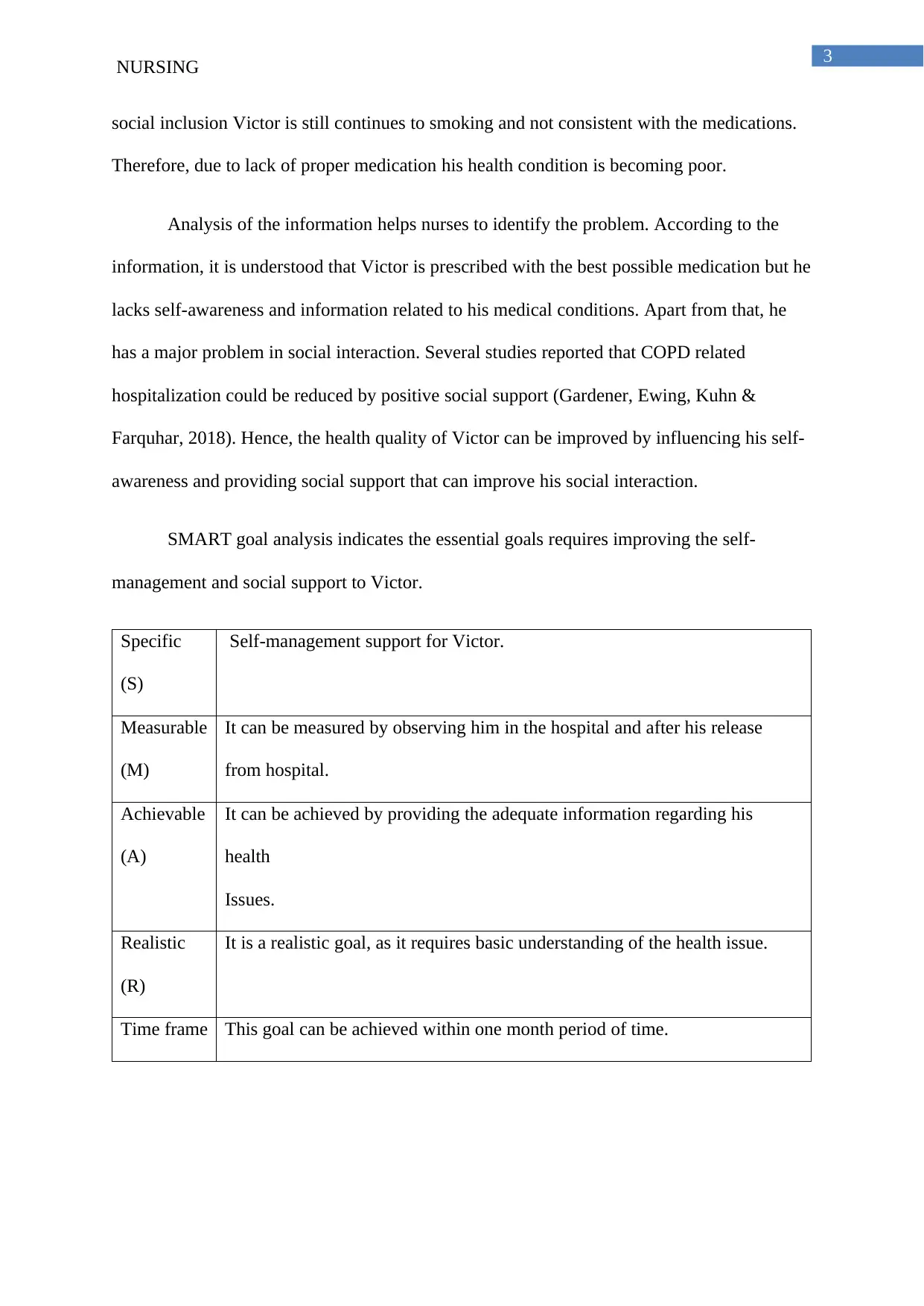
3
NURSING
social inclusion Victor is still continues to smoking and not consistent with the medications.
Therefore, due to lack of proper medication his health condition is becoming poor.
Analysis of the information helps nurses to identify the problem. According to the
information, it is understood that Victor is prescribed with the best possible medication but he
lacks self-awareness and information related to his medical conditions. Apart from that, he
has a major problem in social interaction. Several studies reported that COPD related
hospitalization could be reduced by positive social support (Gardener, Ewing, Kuhn &
Farquhar, 2018). Hence, the health quality of Victor can be improved by influencing his self-
awareness and providing social support that can improve his social interaction.
SMART goal analysis indicates the essential goals requires improving the self-
management and social support to Victor.
Specific
(S)
Self-management support for Victor.
Measurable
(M)
It can be measured by observing him in the hospital and after his release
from hospital.
Achievable
(A)
It can be achieved by providing the adequate information regarding his
health
Issues.
Realistic
(R)
It is a realistic goal, as it requires basic understanding of the health issue.
Time frame This goal can be achieved within one month period of time.
NURSING
social inclusion Victor is still continues to smoking and not consistent with the medications.
Therefore, due to lack of proper medication his health condition is becoming poor.
Analysis of the information helps nurses to identify the problem. According to the
information, it is understood that Victor is prescribed with the best possible medication but he
lacks self-awareness and information related to his medical conditions. Apart from that, he
has a major problem in social interaction. Several studies reported that COPD related
hospitalization could be reduced by positive social support (Gardener, Ewing, Kuhn &
Farquhar, 2018). Hence, the health quality of Victor can be improved by influencing his self-
awareness and providing social support that can improve his social interaction.
SMART goal analysis indicates the essential goals requires improving the self-
management and social support to Victor.
Specific
(S)
Self-management support for Victor.
Measurable
(M)
It can be measured by observing him in the hospital and after his release
from hospital.
Achievable
(A)
It can be achieved by providing the adequate information regarding his
health
Issues.
Realistic
(R)
It is a realistic goal, as it requires basic understanding of the health issue.
Time frame This goal can be achieved within one month period of time.
Secure Best Marks with AI Grader
Need help grading? Try our AI Grader for instant feedback on your assignments.
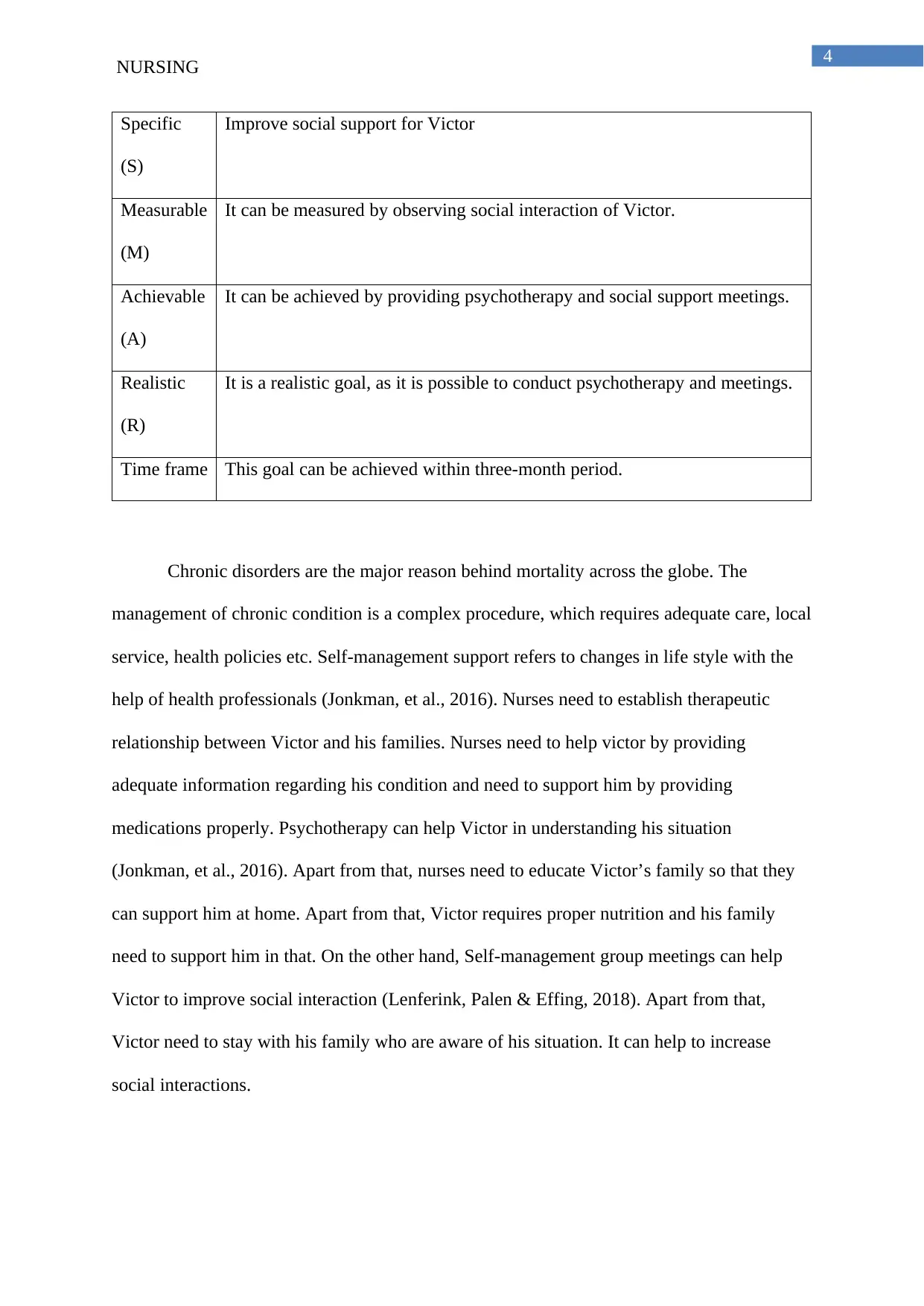
4
NURSING
Specific
(S)
Improve social support for Victor
Measurable
(M)
It can be measured by observing social interaction of Victor.
Achievable
(A)
It can be achieved by providing psychotherapy and social support meetings.
Realistic
(R)
It is a realistic goal, as it is possible to conduct psychotherapy and meetings.
Time frame This goal can be achieved within three-month period.
Chronic disorders are the major reason behind mortality across the globe. The
management of chronic condition is a complex procedure, which requires adequate care, local
service, health policies etc. Self-management support refers to changes in life style with the
help of health professionals (Jonkman, et al., 2016). Nurses need to establish therapeutic
relationship between Victor and his families. Nurses need to help victor by providing
adequate information regarding his condition and need to support him by providing
medications properly. Psychotherapy can help Victor in understanding his situation
(Jonkman, et al., 2016). Apart from that, nurses need to educate Victor’s family so that they
can support him at home. Apart from that, Victor requires proper nutrition and his family
need to support him in that. On the other hand, Self-management group meetings can help
Victor to improve social interaction (Lenferink, Palen & Effing, 2018). Apart from that,
Victor need to stay with his family who are aware of his situation. It can help to increase
social interactions.
NURSING
Specific
(S)
Improve social support for Victor
Measurable
(M)
It can be measured by observing social interaction of Victor.
Achievable
(A)
It can be achieved by providing psychotherapy and social support meetings.
Realistic
(R)
It is a realistic goal, as it is possible to conduct psychotherapy and meetings.
Time frame This goal can be achieved within three-month period.
Chronic disorders are the major reason behind mortality across the globe. The
management of chronic condition is a complex procedure, which requires adequate care, local
service, health policies etc. Self-management support refers to changes in life style with the
help of health professionals (Jonkman, et al., 2016). Nurses need to establish therapeutic
relationship between Victor and his families. Nurses need to help victor by providing
adequate information regarding his condition and need to support him by providing
medications properly. Psychotherapy can help Victor in understanding his situation
(Jonkman, et al., 2016). Apart from that, nurses need to educate Victor’s family so that they
can support him at home. Apart from that, Victor requires proper nutrition and his family
need to support him in that. On the other hand, Self-management group meetings can help
Victor to improve social interaction (Lenferink, Palen & Effing, 2018). Apart from that,
Victor need to stay with his family who are aware of his situation. It can help to increase
social interactions.
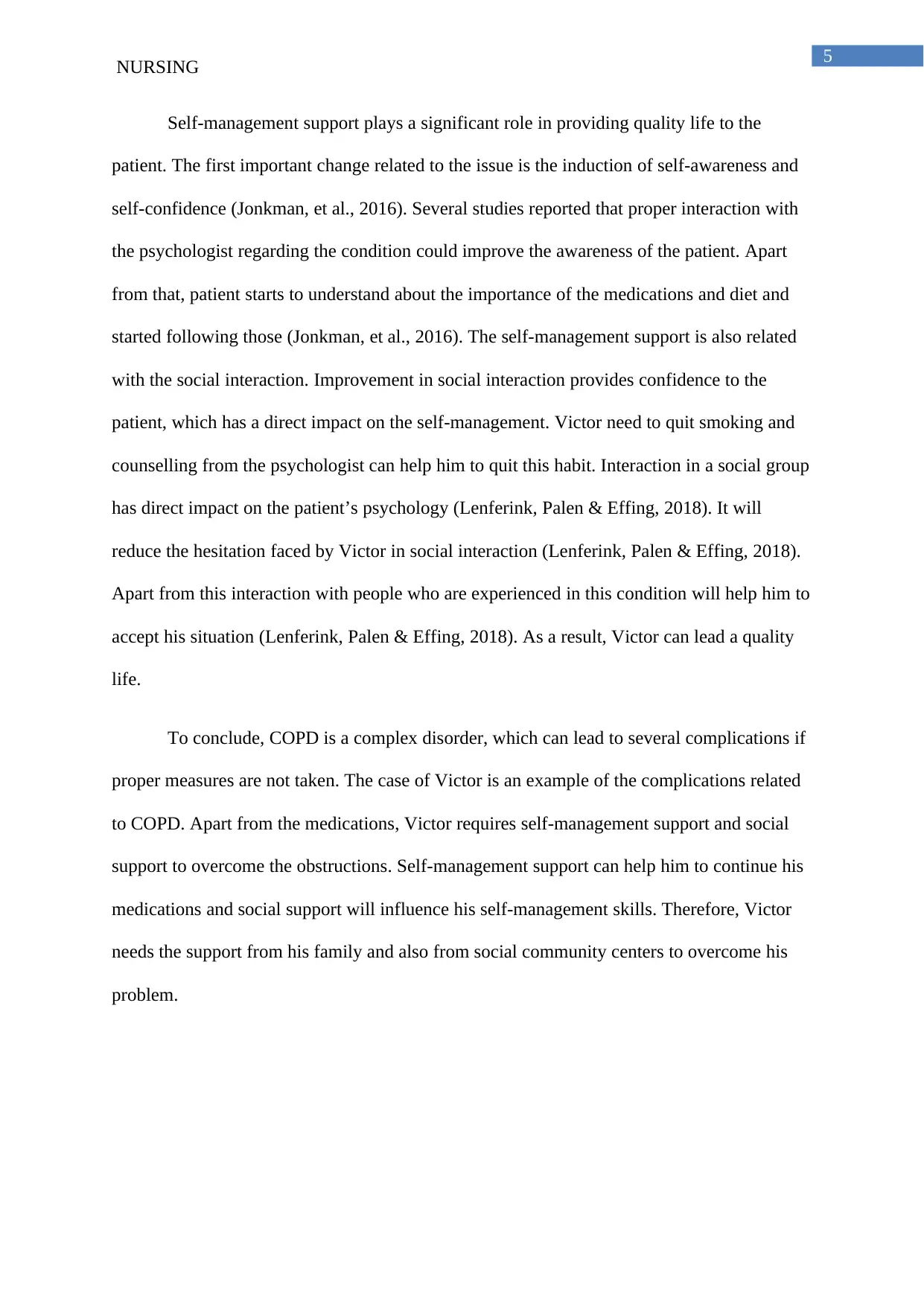
5
NURSING
Self-management support plays a significant role in providing quality life to the
patient. The first important change related to the issue is the induction of self-awareness and
self-confidence (Jonkman, et al., 2016). Several studies reported that proper interaction with
the psychologist regarding the condition could improve the awareness of the patient. Apart
from that, patient starts to understand about the importance of the medications and diet and
started following those (Jonkman, et al., 2016). The self-management support is also related
with the social interaction. Improvement in social interaction provides confidence to the
patient, which has a direct impact on the self-management. Victor need to quit smoking and
counselling from the psychologist can help him to quit this habit. Interaction in a social group
has direct impact on the patient’s psychology (Lenferink, Palen & Effing, 2018). It will
reduce the hesitation faced by Victor in social interaction (Lenferink, Palen & Effing, 2018).
Apart from this interaction with people who are experienced in this condition will help him to
accept his situation (Lenferink, Palen & Effing, 2018). As a result, Victor can lead a quality
life.
To conclude, COPD is a complex disorder, which can lead to several complications if
proper measures are not taken. The case of Victor is an example of the complications related
to COPD. Apart from the medications, Victor requires self-management support and social
support to overcome the obstructions. Self-management support can help him to continue his
medications and social support will influence his self-management skills. Therefore, Victor
needs the support from his family and also from social community centers to overcome his
problem.
NURSING
Self-management support plays a significant role in providing quality life to the
patient. The first important change related to the issue is the induction of self-awareness and
self-confidence (Jonkman, et al., 2016). Several studies reported that proper interaction with
the psychologist regarding the condition could improve the awareness of the patient. Apart
from that, patient starts to understand about the importance of the medications and diet and
started following those (Jonkman, et al., 2016). The self-management support is also related
with the social interaction. Improvement in social interaction provides confidence to the
patient, which has a direct impact on the self-management. Victor need to quit smoking and
counselling from the psychologist can help him to quit this habit. Interaction in a social group
has direct impact on the patient’s psychology (Lenferink, Palen & Effing, 2018). It will
reduce the hesitation faced by Victor in social interaction (Lenferink, Palen & Effing, 2018).
Apart from this interaction with people who are experienced in this condition will help him to
accept his situation (Lenferink, Palen & Effing, 2018). As a result, Victor can lead a quality
life.
To conclude, COPD is a complex disorder, which can lead to several complications if
proper measures are not taken. The case of Victor is an example of the complications related
to COPD. Apart from the medications, Victor requires self-management support and social
support to overcome the obstructions. Self-management support can help him to continue his
medications and social support will influence his self-management skills. Therefore, Victor
needs the support from his family and also from social community centers to overcome his
problem.
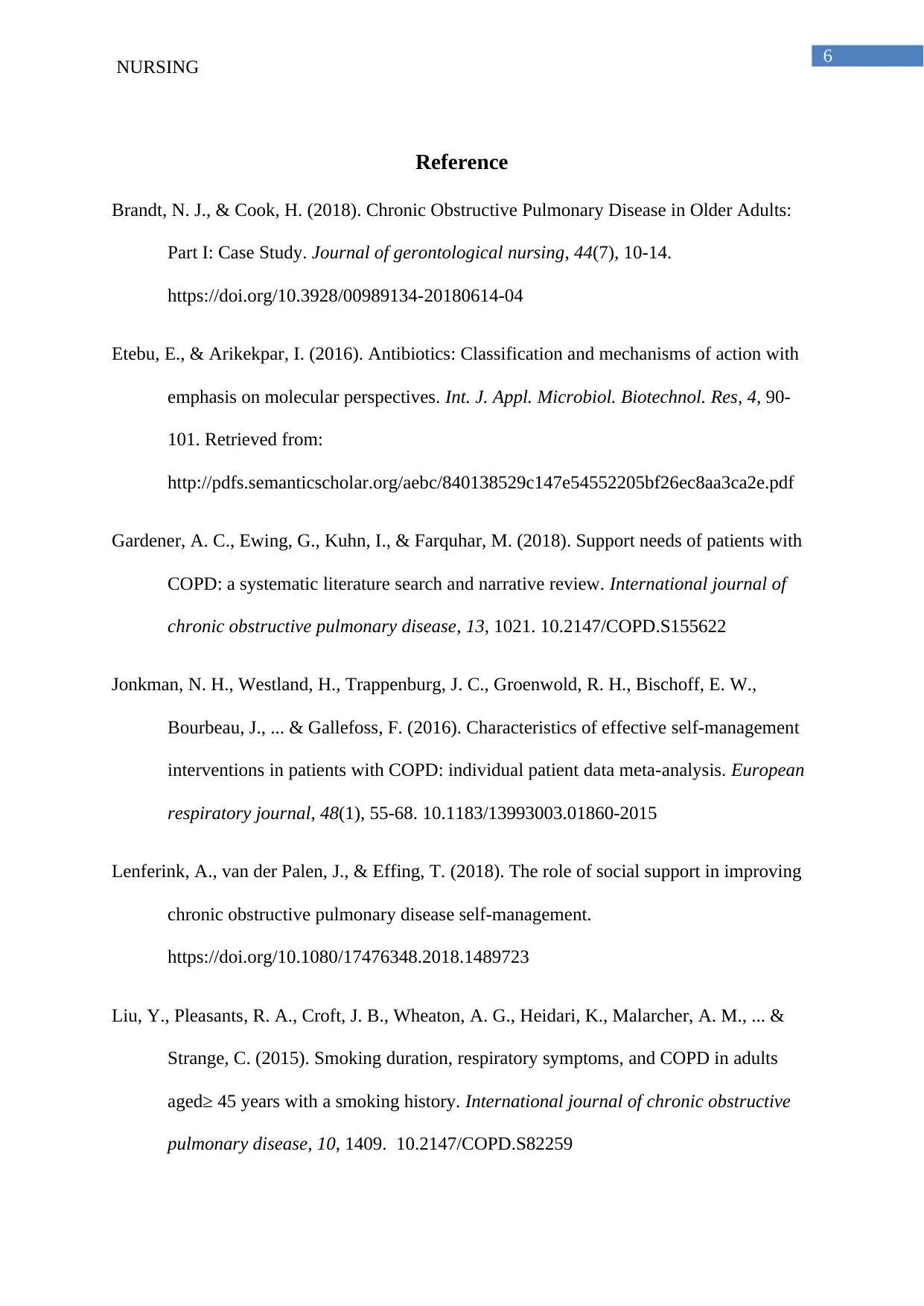
6
NURSING
Reference
Brandt, N. J., & Cook, H. (2018). Chronic Obstructive Pulmonary Disease in Older Adults:
Part I: Case Study. Journal of gerontological nursing, 44(7), 10-14.
https://doi.org/10.3928/00989134-20180614-04
Etebu, E., & Arikekpar, I. (2016). Antibiotics: Classification and mechanisms of action with
emphasis on molecular perspectives. Int. J. Appl. Microbiol. Biotechnol. Res, 4, 90-
101. Retrieved from:
http://pdfs.semanticscholar.org/aebc/840138529c147e54552205bf26ec8aa3ca2e.pdf
Gardener, A. C., Ewing, G., Kuhn, I., & Farquhar, M. (2018). Support needs of patients with
COPD: a systematic literature search and narrative review. International journal of
chronic obstructive pulmonary disease, 13, 1021. 10.2147/COPD.S155622
Jonkman, N. H., Westland, H., Trappenburg, J. C., Groenwold, R. H., Bischoff, E. W.,
Bourbeau, J., ... & Gallefoss, F. (2016). Characteristics of effective self-management
interventions in patients with COPD: individual patient data meta-analysis. European
respiratory journal, 48(1), 55-68. 10.1183/13993003.01860-2015
Lenferink, A., van der Palen, J., & Effing, T. (2018). The role of social support in improving
chronic obstructive pulmonary disease self-management.
https://doi.org/10.1080/17476348.2018.1489723
Liu, Y., Pleasants, R. A., Croft, J. B., Wheaton, A. G., Heidari, K., Malarcher, A. M., ... &
Strange, C. (2015). Smoking duration, respiratory symptoms, and COPD in adults
aged≥ 45 years with a smoking history. International journal of chronic obstructive
pulmonary disease, 10, 1409. 10.2147/COPD.S82259
NURSING
Reference
Brandt, N. J., & Cook, H. (2018). Chronic Obstructive Pulmonary Disease in Older Adults:
Part I: Case Study. Journal of gerontological nursing, 44(7), 10-14.
https://doi.org/10.3928/00989134-20180614-04
Etebu, E., & Arikekpar, I. (2016). Antibiotics: Classification and mechanisms of action with
emphasis on molecular perspectives. Int. J. Appl. Microbiol. Biotechnol. Res, 4, 90-
101. Retrieved from:
http://pdfs.semanticscholar.org/aebc/840138529c147e54552205bf26ec8aa3ca2e.pdf
Gardener, A. C., Ewing, G., Kuhn, I., & Farquhar, M. (2018). Support needs of patients with
COPD: a systematic literature search and narrative review. International journal of
chronic obstructive pulmonary disease, 13, 1021. 10.2147/COPD.S155622
Jonkman, N. H., Westland, H., Trappenburg, J. C., Groenwold, R. H., Bischoff, E. W.,
Bourbeau, J., ... & Gallefoss, F. (2016). Characteristics of effective self-management
interventions in patients with COPD: individual patient data meta-analysis. European
respiratory journal, 48(1), 55-68. 10.1183/13993003.01860-2015
Lenferink, A., van der Palen, J., & Effing, T. (2018). The role of social support in improving
chronic obstructive pulmonary disease self-management.
https://doi.org/10.1080/17476348.2018.1489723
Liu, Y., Pleasants, R. A., Croft, J. B., Wheaton, A. G., Heidari, K., Malarcher, A. M., ... &
Strange, C. (2015). Smoking duration, respiratory symptoms, and COPD in adults
aged≥ 45 years with a smoking history. International journal of chronic obstructive
pulmonary disease, 10, 1409. 10.2147/COPD.S82259
Paraphrase This Document
Need a fresh take? Get an instant paraphrase of this document with our AI Paraphraser
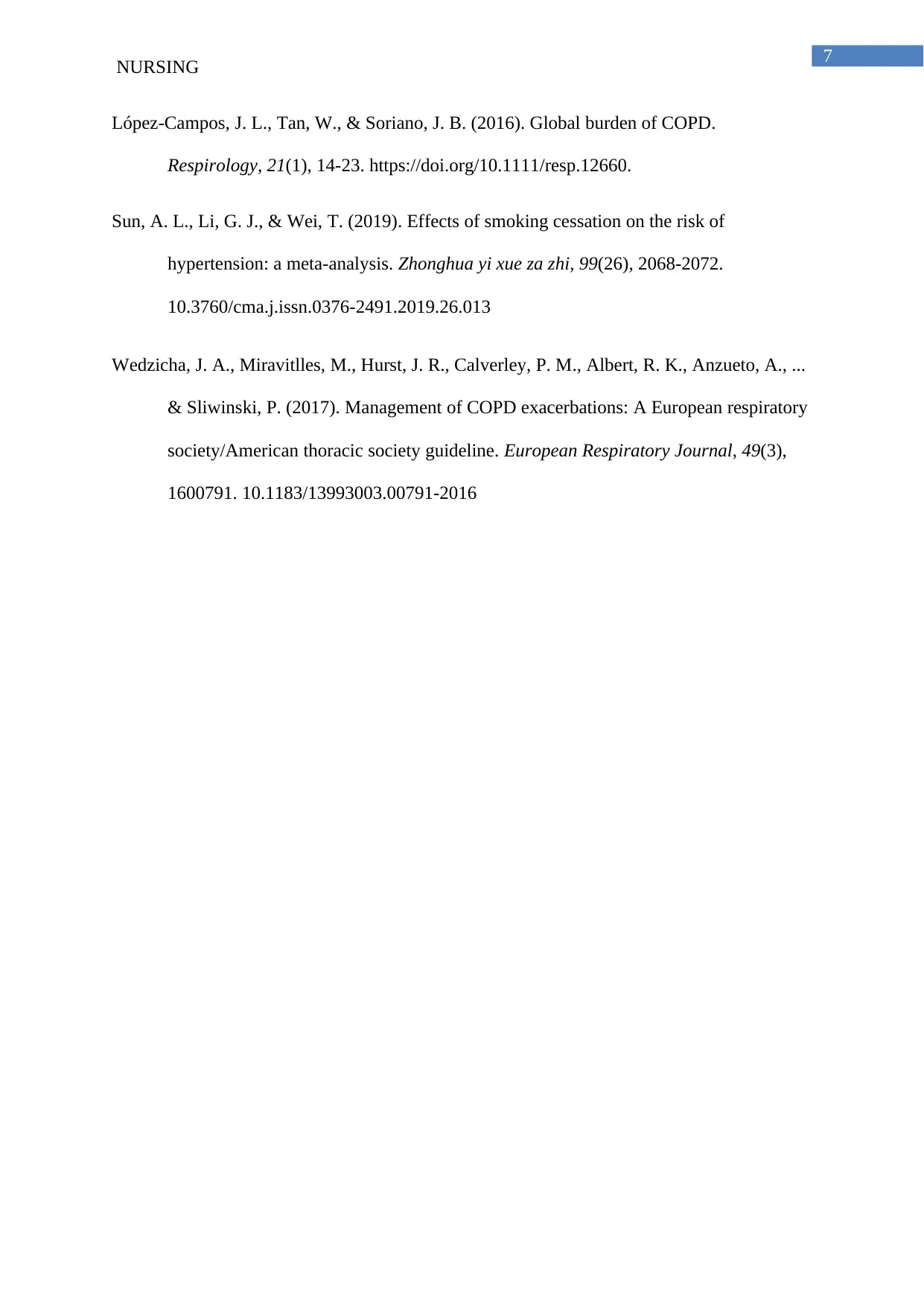
7
NURSING
López‐Campos, J. L., Tan, W., & Soriano, J. B. (2016). Global burden of COPD.
Respirology, 21(1), 14-23. https://doi.org/10.1111/resp.12660.
Sun, A. L., Li, G. J., & Wei, T. (2019). Effects of smoking cessation on the risk of
hypertension: a meta-analysis. Zhonghua yi xue za zhi, 99(26), 2068-2072.
10.3760/cma.j.issn.0376-2491.2019.26.013
Wedzicha, J. A., Miravitlles, M., Hurst, J. R., Calverley, P. M., Albert, R. K., Anzueto, A., ...
& Sliwinski, P. (2017). Management of COPD exacerbations: A European respiratory
society/American thoracic society guideline. European Respiratory Journal, 49(3),
1600791. 10.1183/13993003.00791-2016
NURSING
López‐Campos, J. L., Tan, W., & Soriano, J. B. (2016). Global burden of COPD.
Respirology, 21(1), 14-23. https://doi.org/10.1111/resp.12660.
Sun, A. L., Li, G. J., & Wei, T. (2019). Effects of smoking cessation on the risk of
hypertension: a meta-analysis. Zhonghua yi xue za zhi, 99(26), 2068-2072.
10.3760/cma.j.issn.0376-2491.2019.26.013
Wedzicha, J. A., Miravitlles, M., Hurst, J. R., Calverley, P. M., Albert, R. K., Anzueto, A., ...
& Sliwinski, P. (2017). Management of COPD exacerbations: A European respiratory
society/American thoracic society guideline. European Respiratory Journal, 49(3),
1600791. 10.1183/13993003.00791-2016
1 out of 8
Related Documents
Your All-in-One AI-Powered Toolkit for Academic Success.
+13062052269
info@desklib.com
Available 24*7 on WhatsApp / Email
![[object Object]](/_next/static/media/star-bottom.7253800d.svg)
Unlock your academic potential
© 2024 | Zucol Services PVT LTD | All rights reserved.





